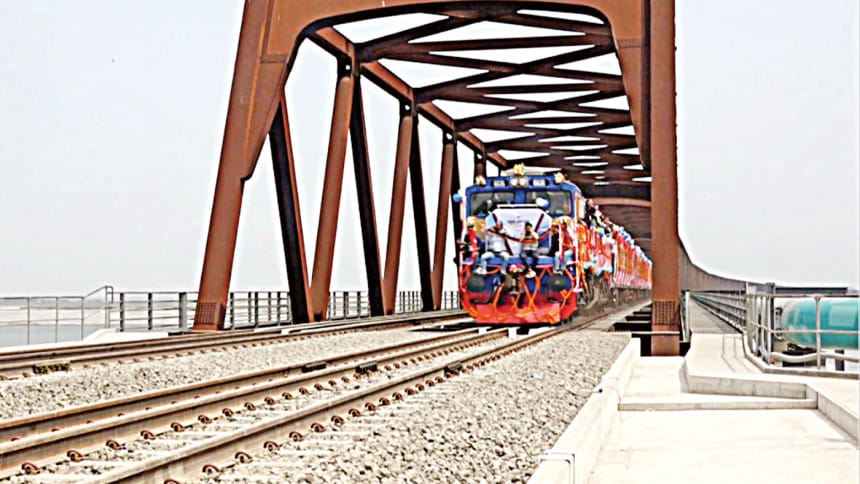A dream comes true as Jamuna Rail Bridge opens

The much-awaited Jamuna Rail Bridge, the longest dedicated railway bridge in the country, was formally inaugurated yesterday.
The 4.8-kilometre dual-gauge double-track bridge, replacing the existing road-rail bridge over the Jamuna River, is expected to improve railway connectivity between Dhaka and the northwestern region.
The new bridge will allow trains to travel across the river in less than three minutes. In comparison, it took trains 30 minutes to cross the old road-rail bridge.
However, because the new double-track bridge is currently connected to single-line tracks on both sides, trains will still have to wait for crossings.
This will be the case until two crucial projects are completed, which is unlikely before 2030. One involves the construction of a double line from Joydebpur to Ishwardi, while the other is for a direct railway link between Sirajganj and Bogura.
Unlike the grand inaugurations of similar mega projects under the previous government, the bridge—built at a cost of Tk 16,781 crore—was opened without much fanfare.
Railways Secretary Fahimul Islam inaugurated the bridge at Ibrahimabad Rail Station in Tangail. Japanese Ambassador to Bangladesh SAIDA Shinichi and JICA Director General for South Asia Ito Teruyuki were present at the programme.
Bangladesh Railway Director General Afzal Hossain presided over the event, while Project Director Aal Fattah Md Masudur Rahman delivered the welcome speech.
Following the inauguration, a six-coach special train carrying guests and officials departed from Ibrahimabad Station at 12:09 pm and arrived at Sayedabad Railway Station in Sirajganj at 12:19 pm.
After a press conference at Sayedabad, the train returned to Ibrahimabad Rail Station with the guests.
The east and west zones of Bangladesh Railway were first connected with the opening of the Jamuna Bridge in June 1998, featuring a single railway track alongside a four-lane road.
However, nearly a decade after its inauguration, a crack appeared on the bridge, prompting authorities to impose both load and speed restrictions on railway operations. As a result, freight trains were not allowed on the bridge and the speed limit for passenger trains was limited to 20 km/h.
In December 2016, the Executive Committee of the National Economic Council approved the Bangabandhu Sheikh Mujibur Rahman Railway Bridge project with an initial budget of Tk 9,734 crore, aiming for completion by December 2023.
After the political change over in August last year, the interim government renamed the bridge as Jamuna Railway Bridge. The construction of the rail bridge was completed in December 2024.
After the detailed design was finalised in September 2018, the costs of two major work packages increased significantly. Additional expenses for land acquisition, land lease, and the construction of a museum were also incorporated, raising the total project cost to Tk 16,781 crore.
Japan provided 72 percent of the funding through soft loans, and two Japanese joint-venture firms were involved in the bridge's construction.
Physical work on the project began in August 2020 and was completed in four and a half years, employing over 7,000 workers from Japan, Vietnam, Nepal, Australia, the Philippines, and Bangladesh.
The bridge is constructed on 50 pillars with 49 spans. Located 300 meters upstream of the existing Jamuna Bridge, the new railway bridge will accommodate up to 88 trains daily.
Tanvirul Islam, the project's chief engineer, told reporters that Japanese-made rail tracks have been installed on the bridge. "As a result, trains will in theory be able to reach a speed of up to 120 km/h. However, the operation speed limit has been set at 100 km/h."
On February 12, BR started operating passenger trains through the newly built bridge on a trial basis, using one of the two lanes of the bridge.
From today, both lines will be open for operation.
Train fares for routes using the bridge will rise from today, due to the increased pontage charge, a toll levied for the construction and maintenance of a bridge.
For instance, the fare on the Dhaka-Rajshahi route will rise for a non-AC chair seat by Tk 45, an AC chair by Tk 80, an AC seat by Tk 95, and an AC berth by Tk 140, officials said.
[Our correspondent from Tangail also contributed the report.]

 For all latest news, follow The Daily Star's Google News channel.
For all latest news, follow The Daily Star's Google News channel. 



Comments